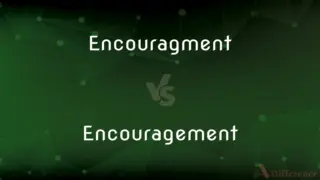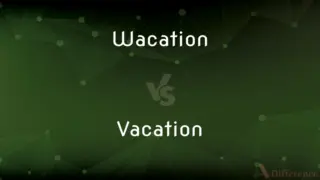Laguage vs. Language — Which is Correct Spelling?
By Tayyaba Rehman — Updated on March 21, 2024
"Laguage" is a misspelling. The correct spelling is "Language," referring to a method of human communication.
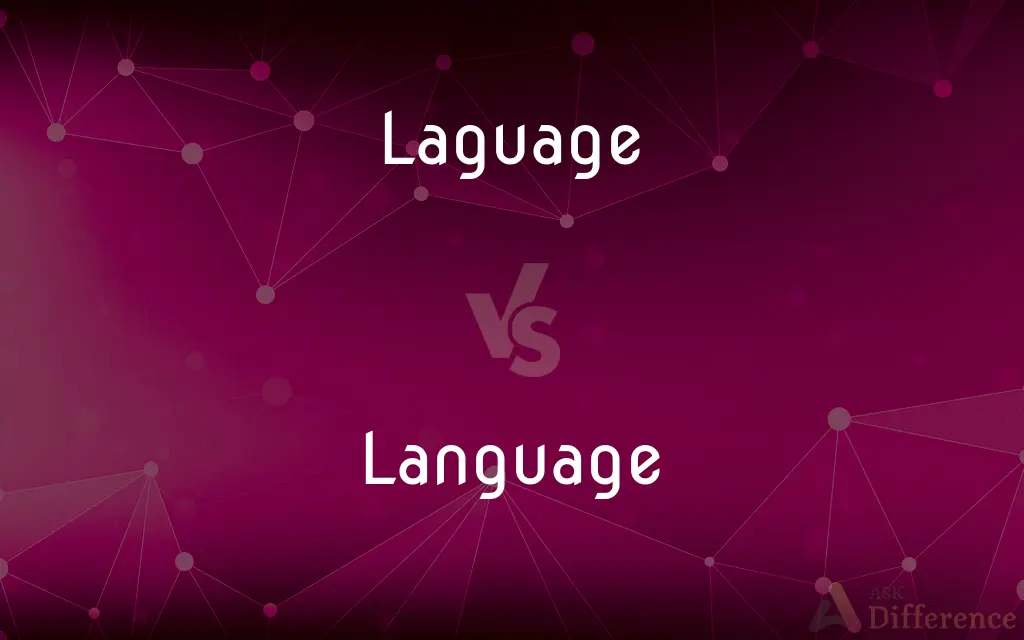
Table of Contents
Which is correct: Laguage or Language
How to spell Language?

Laguage
Incorrect Spelling

Language
Correct Spelling
ADVERTISEMENT
Key Differences
The "gu" in "language" sounds like the "gu" in "guitar."
Remember it like this: we use our tongue to speak a "language," and "tongue" has a "gu" in it just like "language."
Mnemonic: "Learning A New GUAge means learning a new LANGUAGE."
Recall that "language" has two 'a's – one after 'l' and another before 'g'.
The word "age" is at the end of "language."
ADVERTISEMENT
How Do You Spell Language Correctly?
Incorrect: The laguage barrier made it difficult for them to communicate.
Correct: The language barrier made it difficult for them to communicate.
Incorrect: Laguage is not a word you need for writing an essay.
Correct: Language is a crucial aspect of culture and communication.
Incorrect: His laguage skills have improved significantly since he moved to the United States.
Correct: His language skills have improved significantly since he moved to the United States.
Incorrect: The computer program can understand natural laguage input.
Correct: The computer program can understand natural language input.
Language Definitions
A system of communication using sounds or symbols.
English is a widely spoken language.
The method of human expression either spoken or written.
Body language can convey emotions.
The manner or style of a piece of writing or speech.
His language was poetic and emotive.
A language is a structured system of communication used by humans, based on speech and gesture (spoken language), sign, or often writing. The structure of language is its grammar and the free components are its vocabulary.
Communication of thoughts and feelings through a system of arbitrary signals, such as voice sounds, gestures, or written symbols.
Such a system including its rules for combining its components, such as words.
Such a system as used by a nation, people, or other distinct community; often contrasted with dialect.
A system of signs, symbols, gestures, or rules used in communicating
The language of algebra.
(Computers) A system of symbols and rules used for communication with or between computers.
Body language; kinesics.
The special vocabulary and usages of a scientific, professional, or other group
"his total mastery of screen language—camera placement, editing—and his handling of actors" (Jack Kroll).
A characteristic style of speech or writing
Shakespearean language.
A particular manner of expression
Profane language.
Persuasive language.
The manner or means of communication between living creatures other than humans
The language of dolphins.
Verbal communication as a subject of study.
The wording of a legal document or statute as distinct from the spirit.
(countable) A body of words, and set of methods of combining them (called a grammar), understood by a community and used as a form of communication.
The English language and the German language are related.
Deaf and mute people communicate using languages like ASL.
(uncountable) The ability to communicate using words.
The gift of language
(uncountable) A sublanguage: the slang of a particular community or jargon of a particular specialist field.
Legal language;
The language of chemistry
The expression of thought (the communication of meaning) in a specified way; that which communicates something, as language does.
Body language;
The language of the eyes
A body of sounds, signs and/or signals by which animals communicate, and by which plants are sometimes also thought to communicate.
A computer language; a machine language.
(uncountable) Manner of expression.
(uncountable) The particular words used in a speech or a passage of text.
The language used in the law does not permit any other interpretation.
The language he used to talk to me was obscene.
(uncountable) Profanity.
A languet, a flat plate in or below the flue pipe of an organ.
To communicate by language; to express in language.
An admonishment said in response to vulgar language.
Any means of conveying or communicating ideas;
The expression of ideas by writing, or any other instrumentality.
The forms of speech, or the methods of expressing ideas, peculiar to a particular nation.
The characteristic mode of arranging words, peculiar to an individual speaker or writer; manner of expression; style.
Others for language all their care express.
The inarticulate sounds by which animals inferior to man express their feelings or their wants.
The suggestion, by objects, actions, or conditions, of ideas associated therewith; as, the language of flowers.
There was . . . language in their very gesture.
The vocabulary and phraseology belonging to an art or department of knowledge; as, medical language; the language of chemistry or theology.
A race, as distinguished by its speech.
All the people, the nations, and the languages, fell down and worshiped the golden image.
Any system of symbols created for the purpose of communicating ideas, emotions, commands, etc., between sentient agents.
Any set of symbols and the rules for combining them which are used to specify to a computer the actions that it is to take; also referred to as a computer lanugage or programming language; as, JAVA is a new and flexible high-level language which has achieved popularity very rapidly.
A systematic means of communicating by the use of sounds or conventional symbols;
He taught foreign languages
The language introduced is standard throughout the text
The speed with which a program can be executed depends on the language in which it is written
(language) communication by word of mouth;
His speech was garbled
He uttered harsh language
He recorded the spoken language of the streets
A system of words used in a particular discipline;
Legal terminology
The language of sociology
The cognitive processes involved in producing and understanding linguistic communication;
He didn't have the language to express his feelings
The mental faculty or power of vocal communication;
Language sets homo sapiens apart from all other animals
The text of a popular song or musical-comedy number;
His compositions always started with the lyrics
He wrote both words and music
The song uses colloquial language
The vocabulary and grammar used by a particular group.
Computer programmers use a specific language.
A nonverbal means of communication.
The language of flowers has romantic meanings.
Language Meaning in a Sentence
The language of music is universal and can be understood by everyone.
The English language has many words borrowed from other languages.
Understanding a new language can open up a world of opportunities.
Many people believe that body language speaks louder than words.
Language arts is one of her favorite subjects in school.
Understanding the language of mathematics is essential for engineering.
The teacher praised him for his excellent language skills.
Learning a second language at a young age can be very beneficial.
She used sign language to communicate with her deaf friend.
The novel uses beautiful language to describe the setting.
Language translation technology has improved greatly over the years.
They are studying the language and culture of Japan.
The language used in legal documents can be difficult to understand.
The language in this book might be too advanced for young readers.
Language development in children is a fascinating process.
He loves studying the origins of words and language.
Her language became more sophisticated as she learned more vocabulary.
Language learning apps have become very popular.
The poet is known for her rich use of language.
Scientists are trying to decode the language of dolphins.
Common Curiosities
What is the root word of Language?
The root word is the Latin "lingua."
What is the verb form of Language?
"Language" doesn't have a common verb form, but "linguistic" is an adjective form.
Which vowel is used before Language?
Often, the article "a" or "the" can precede "language."
Why is it called Language?
It comes from the Latin word "lingua," meaning "tongue" or "speech."
What is the singular form of Language?
Language.
Is Language an abstract noun?
Yes.
What is the pronunciation of Language?
Language is pronounced as /ˈlæŋɡwɪdʒ/.
Which conjunction is used with Language?
Any conjunction can be used depending on context, e.g., "and," "but."
What is the plural form of Language?
Languages.
Which preposition is used with Language?
"in" as in "in a language."
Is the Language term a metaphor?
Not inherently, but can be used metaphorically in contexts.
Is the word Language imperative?
No.
How do we divide Language into syllables?
Lan-guage.
What is a stressed syllable in Language?
The first syllable, "Lan-," is stressed.
What is another term for Language?
Tongue or dialect.
What is the opposite of Language?
There isn't a direct opposite, but "silence" is an antonym in certain contexts.
What is the first form of Language?
Language itself is not a verb; hence, it doesn't have verb forms.
Is Language a vowel or consonant?
"Language" is a word containing both vowels and consonants.
What is the second form of Language?
See above.
Which article is used with Language?
Both "a" and "the" can be used.
Is Language a negative or positive word?
Neutral.
What is the third form of Language?
See above.
How is Language used in a sentence?
"Learning a new language can be both challenging and rewarding."
Is Language a noun or adjective?
Language is primarily a noun.
Is Language an adverb?
No.
How many syllables are in Language?
Two.
What part of speech is Language?
Noun.
Is Language a countable noun?
Yes, when referring to different types (e.g., languages).
Is Language a collective noun?
No.
Which determiner is used with Language?
Determiners like "this," "that," "a," and "the" can be used.
Share Your Discovery
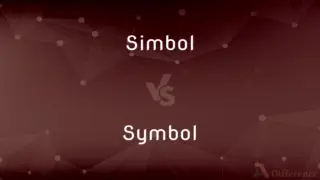
Previous Comparison
Simbol vs. Symbol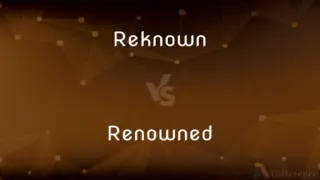
Next Comparison
Reknown vs. RenownedAuthor Spotlight
Written by
Tayyaba RehmanTayyaba Rehman is a distinguished writer, currently serving as a primary contributor to askdifference.com. As a researcher in semantics and etymology, Tayyaba's passion for the complexity of languages and their distinctions has found a perfect home on the platform. Tayyaba delves into the intricacies of language, distinguishing between commonly confused words and phrases, thereby providing clarity for readers worldwide.

































